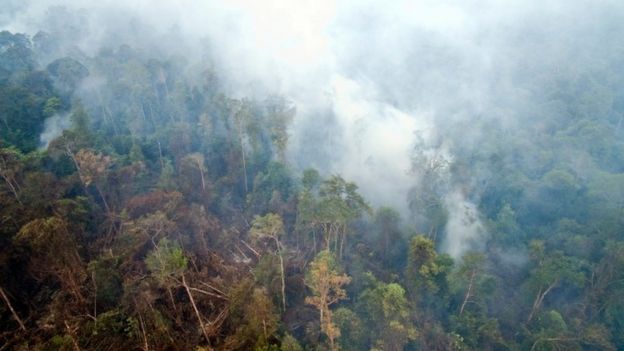Air Pollution: Extra, Toxic, Hazards to the Air We Breathe
Extra air pollution hazards reported in two news stories demonstrate little known threats to the air that we breathe. These toxins, methane and carbon dioxide (CO2) emitting from nature, and triggered by man, compound industrial influences. The two articles are:
Indonesian forest fires on track to emit more CO2 than the UK by Damian Carrington,
Permafrost-Eating Bacteria: A New Twist on Thawing Arctic and Global Warming by Thomas S Bianchi, University of Florida
Both of these articles did not make headlines. Both shed light on the complexities of our environment and the air we breathe. For this post, facts about a distant forest fire (Indonesia) caught my attention.
Indonesian forest fires increase air pollution 
- Fires are raging across the forests and peatlands of Indonesia
- The fires, mostly started deliberately and illegally to clear forest for paper and palm oil production, are on track to match the worst ever year of their forest burning, 1997.
- In 1997, the fires carbon emissions caused the biggest annual jump in CO2 ever recorded.
- The burning peat is a vast smoldering stove, burning up to 33 feet deep.
- The threat to local wildlife (Orangutans etc.) is extreme.
- The air pollution from these fires effect the entire region.
The region is currently experiencing a strong El Nino climate phenomenon. This has created drought conditions in Indonesia, exacerbating years of draining the peatlands, and  creating tinderbox conditions.
creating tinderbox conditions.
“Ironically, intact peatlands are actually very fire resistant, protected by a high water table, said Professor Susan Page, an expert on Indonesia’s peatlands at the University of Leicester, UK.
“The problem arises when peatlands are drained. Dry peat ignites very easily and can burn for days or weeks, even smouldering underground and reemerging away from the initial source. This makes them incredibly difficult to extinguish.”
The only permanent solution is to restore and protect the rainforests and peatlands. In the meantime, thick smoke chokes cities in the region will likely cause the premature deaths of over 100,000 people in the region. In addition the fires are destroying vital habitats for endangered orangutans and clouded leopards.
The increased CO2 affects us all.


